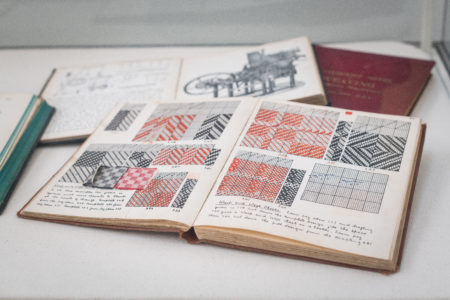
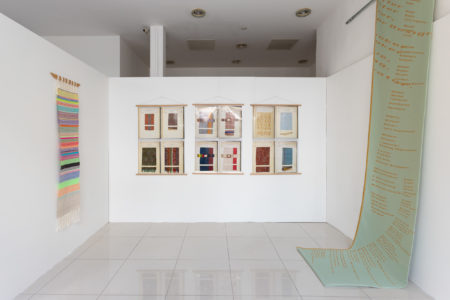
Commissioned for Art in Manufacturing in 2019 in collaboration with British Textile Biennial, Raisa Kabir began working between John Spencer, a sixth generation family weaving business and the last remaining traditional cotton weaver in Burnley, and Queen Street Mill, now a Grade 1 listed Museum with extensive archives and the last surviving 19th century steam powered weaving mill in the world.
The works presented at the National Festival of Making interwove geographical and historical connections between these two industrial spaces, global textile archives and communities of Lancashire.
Work exhibited was created in response to a two-year textile archive research project centred around The Textile Manufactures of India, an 18 volume set of fabric sample books assembled in 1866 by John Forbes Watson, a copy of which is held in the Harris Museum and Art Gallery, Preston.


Using textiles collected from the Indian Subcontinent for the India Museum, Watson cut the cloths into samples to create the volumes,13 sets of 18 books, sent to design schools and manufacturers. Kabir researched the particular examples in the series that name Diasporas of those living in Burnley and beyond, whose families migrated to Lancashire from places such as Punjab, Lahore, Kashmir, Dhaka, and Sylhet; the places where the designs were originally created.
Exhibited as part of the collaboration with John Spencer Textiles is a jacquard woven panel detailing the job titles of all the workers at John Spencer. Woven into a poem, the rhythms are nods to the constant hum and buzz of the weaving shed floor, while the layers of woven titles champion the legacies and labour of textile workers, local and worldwide.
Resistances reclaims the identities and cultures of the people and places who are rarely credited in British archives by weaving this series of new patterns, including samples from the geographies mentioned, and creating a woven text of pattern designs that relate to collective imaginings of place and belonging in East Lancashire.
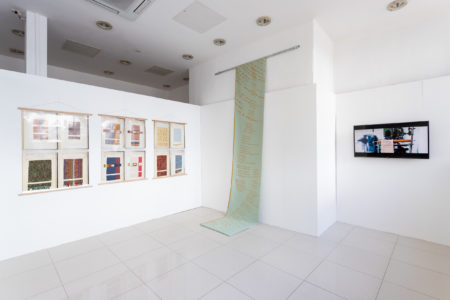
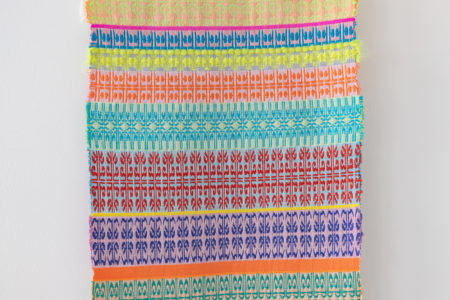
To see the connections between craft work and industrial textile production in action, has bolstered my practice and fed into the commission to explore these tensions and correlations in weaving and weaving history in the area. It has been a joy to meet the many people behind the Burnley manufacturer and witness the strong collective identity and history of the brand being woven into every aspect of the company

The Artist
Raisa Kabir works in an interdisciplinary practice with particular attention to textiles, sound and performance and the processes, movements and materials of global production. Through this, she expresses notions and complexities of colonial residues and socio-politics left by labour, indenture, cultivation of borders and violence. She is a graduate of Chelsea College of Art and Design and has exhibited in The Whitworth, The Textile Arts Center NYC, Center for Craft, Creativity, and Design, U.S, Ford Foundation Gallery NYC, Glasgow International, Center for Contemporary Art Glasgow, and Indian Art Fair.
The Manufacturer
John Spencer is part of a long tradition of textiles manufacturing in Pennine Lancashire, weaving textiles for a wide breadth of industries from fashion to automotive sector; and purposes from military uniforms to parachutes. A family business that is committed to the preservation of traditional crafts and skills and producing fabrics that are ‘Made in Britain’ and is custom-made to their clients designs and specifications.
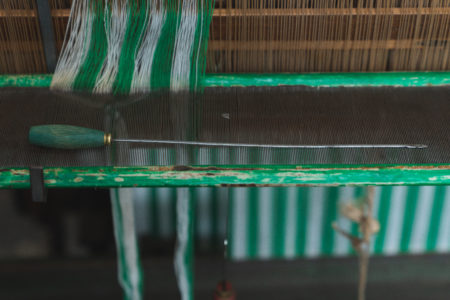
Photography by Jules Lister, Robin Zahler, Matthew Savage and Richard Tymon